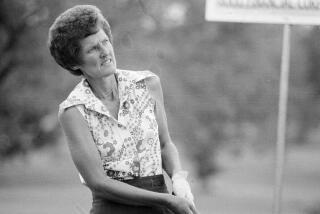Whitworth Spy Trial Focuses In on Money
- Share via
SAN FRANCISCO — Jerry A. Whitworth, speaking into a recorder as he taped a message to a friend, seemed supremely confident that he would never have to explain the thousands of dollars in cash that had passed through his hands.
Even if the Internal Revenue Service ever learned of his cash expenditures, he said, “That doesn’t mean I’d get in trouble. It just means I’d have to do some explaining.”
But within weeks of making the tape, the retired Navy petty officer was in jail on spy charges. And as FBI agents built an espionage case against Whitworth, IRS agents at the same time went through every receipt, bank account and charge card slip they could find.
IRS Investigation
The result of the IRS work was revealed in a federal courtroom here during the last 2 1/2 weeks as prosecutors turned the focus in Whitworth’s trial from espionage to charges that he failed to pay taxes on $332,000--money he allegedly earned by stealing Navy secrets that ended up in Soviet hands.
Whitworth is charged with 13 counts of espionage and tax evasion and faces life in prison if convicted.
By the time the tax case against Whitworth ended Thursday, witnesses had discussed in minute detail how Whitworth had spent at least $138,465 more than he and his wife made from legitimate sources between 1979 and 1984, the years that are the focus of the tax case against him.
In many years, Whitworth spent none of his Navy income, leaving all but $4,355 of the $105,342 he earned between 1979 and 1984 in savings accounts. Meanwhile, he bought things he needed and wanted with cash.
The money afforded him everything from gourmet meals at San Francisco’s finest restaurants to a $954 cockatoo and an elaborate $20,000 personal computer system. Whitworth bought top-of-the-line cameras and computer equipment, a Fiat sports car, his-and-her motorcycles, a $2,010 home burglar alarm, and during one spree at a boutique, $853 worth of lingerie.
The evidence also included that tape recording, which agents seized soon after Whitworth’s arrest in June, 1985, and which prosecutors played for the jury.
Pay in Cash
Whitworth sounded like a professor as he counselled his friend in May, 1985, when Whitworth was studying for a stockbroker’s license. The advice was simple: Spend the money in cash and don’t tell the IRS about it.
This had worked for him, said Whitworth.
Whitworth usually dealt in cash, often with $50 bills, witnesses testified. According to earlier testimony, the Soviets often paid in $50 bills, because $20 bills would have been too bulky for the size of the payments, and bills of $100 or more would have attracted undue attention.
But while Whitworth used cash, which is hard to trace, he slipped up by keeping receipts at his Davis mobile home. IRS agents also found records of 42 bank accounts and 44 credit card accounts, plus assorted safe deposit boxes where Whitworth allegedly stored the cash he got from John A. Walker Jr., the admitted leader of the spy ring. Walker has testified that he recruited Whitworth in 1974 and passed the secrets Whitworth sold him to the Soviets until his arrest last year.
Using receipts and bank records, IRS agents found more than 50 store clerks, investment house employees and others who told jurors about Whitworth’s purchases. And for a Navy enlisted man, married to a college student, Whitworth and his wife, Brenda Reis, lived well
“Jerry was very generous,” said Celia Vanderpool, a friend and a San Clemente school teacher who testified that Whitworth and Reis paid in cash when they took her to fine restaurants, and gave her gifts of earrings, magazine subscriptions and expensive liquor and wine.
Varied Tastes
The couple’s taste varied widely. Whitworth bought two boxes at the San Francisco Opera for the summer, 1983, series, and gave a $200 donation to the opera. On weekend trips to San Francisco, the couple stayed at such posh Nob Hill hotels as the Stanford Court.
Whitworth also spent $4,372 on curios from Franklin Mint, a Pennsylvania mail order house that sells such items as coins, lithographs and Big Band records.
Reis, who faces no charges, also spent lavishly at times, twice renting Rolls Royces to meet Whitworth when his ship, the Enterprise, came in.
In 1983, she sent him a telegram while he was aboard the Enterprise, asking permission to spend $4,000 on Salvador Dali prints. In the telegram, entered into evidence here, Dali’s name was misspelled.
On that same 1983 Enterprise tour, Whitworth sent Reis a Western Union telegram asking her to buy 10 gold Krugerrand coins.
“Discretion please,” the message said.
Posed As Investor
Whitworth often gave the impression that he was a successful investor, witnesses have said. He had subscriptions to the Wall Street Journal, Barrons and an array of financial advice newsletters, for which he took tax deductions of $6,500 between 1979 and 1984.
As it turned out, he not only failed his stockbrokers exam shortly before his arrest, but lost nearly $30,000 on his investments between 1979 and 1984, IRS agents testified. One reversal came a few months after he bought the gold coins when he sold them at a loss of $1,000, a witness said.
Prosecutors are expected to conclude their case this week. Defense lawyers estimate it will take them two weeks to present their side of the case.
More to Read
Inside the business of entertainment
The Wide Shot brings you news, analysis and insights on everything from streaming wars to production — and what it all means for the future.
You may occasionally receive promotional content from the Los Angeles Times.










